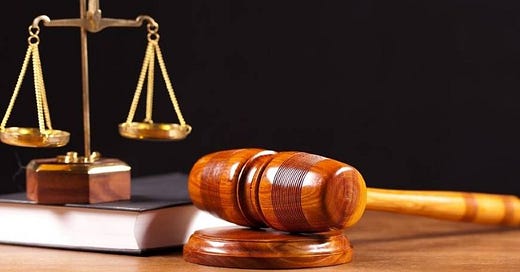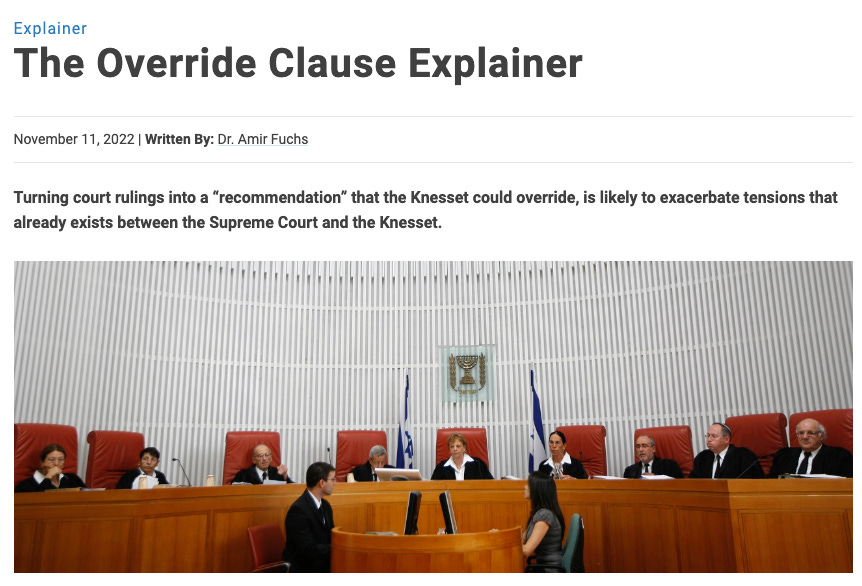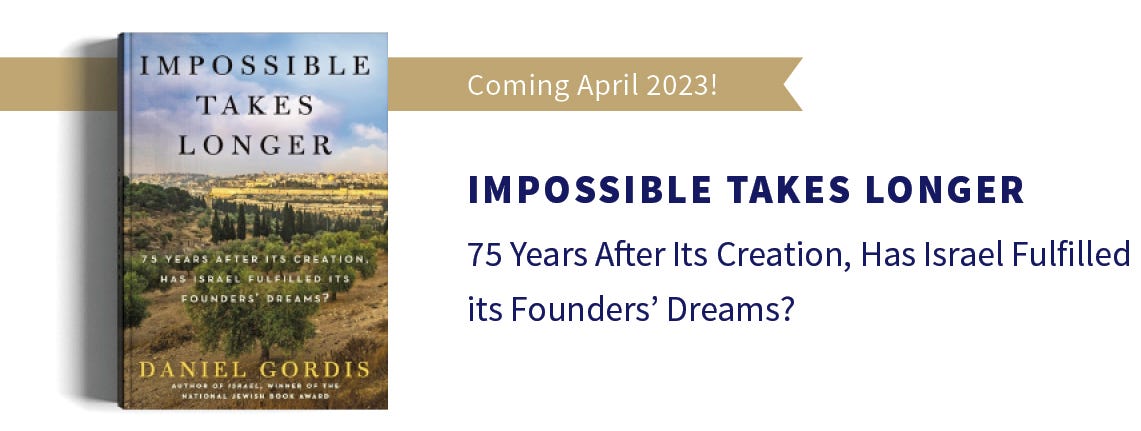

Discover more from Israel from the Inside with Daniel Gordis
Alan Dershowitz: "If I were in Israel I'd be joining the protests against the government. Civil liberties and minority rights are in danger...."
... But it's a lot more complicated than that. This week we try to sort through the debate taking place about Israel's judicial system.

Last week, the newly appointed Minister of Justice, Yariv Levin, announced a plan to rebuild Israel’s judicial system. Depending where you stand on the issue, the news about the suggested reforms either delighted you or filled you with dread. It’s also quite possible that between all the headlines and politicking, you’re not sure about either stance.
One thing is certain: Israel’s judicial system is much more complex and nuanced than the press on either side is willing to acknowledge. In today’s column, our objective is to provide readers with some materials for learning more. Responsible participation in the conversation requires knowledge and exposure to both sides, a balance and nuance which are painfully missing from the discourse in today’s world.
The purpose of Israel from the Inside is to break out of the echo chamber, to listen to those with whom we disagree, and to walk away more thoughtful, even if not changed. Today, on this particularly crucial issue, we are providing sources for you to edify yourself with if you are interested.
TWO VIEWS WHO ARGUE THAT THE SKY IS NOT FALLING
The link below will take you to a clip of Professor Moshe Koppel, chairman of the Kohelet Policy Forum. Professor Koppel has co-drafted proposed constitutions for Israel and has drafted several laws that were passed in the Knesset. We spoke with Moshe on Israel from the Inside back in August 2021 about the Nation State law. You can listen to that interview here.

Yonatan Green is the Executive Director of the Israel Law & Liberty Forum.
His piece, “The judicial apocalypse is not upon us,” explains why the proposed reforms do not “warrant a collective panic attack.”
TWO VIEWS WHO ARGUE THE REFORMS ARE DANGEROUS
The Israel Democracy Institute Override Cause Explainer. Here Dr. Amir Fuchs
Senior Researcher at IDI declares that an override clause would turn Israel into “one of the weakest democracies in the world, constitutionally speaking…”
Professor Suzie Navot, Vice President of Research at the Israel Democracy Institute and Professor of Constitutional Law, further explains the override clause.
Professor Yaniv Roznai, Associate Professor and Vice-Dean at Reichman University's Harry Radzyner Law School discusses why he fears the proposed reforms spell destruction of Israel’s democracy.
REFORM OR RUIN?
Dr. Guy Lurie, attorney and research fellow at the Israel Democracy Institute take a middle-position and explains why some changes to the judicial system might be necessary, but warns that too much change would seriously harm the independence of the judicial branch.
Lastly, the link below will take you to a debate hosted by The Times of Israel on the subject. The speakers include David Horovitz, Founding Editor of The Times of Israel; Prof. Amichai Cohen, Senior Fellow at the IDI’s Center for Security and Democracy; Prof. Yaniv Roznai of Reichman University; Prof. Moshe Koppel, founder of the Kohelet Policy Forum; Dr. Tamar Hostovsky Brandes of the Ono Academic College Faculty of Law; Adv. Shlomit Ravitsky Tur-Paz, director of the IDI’s Religion and State Program and Adv. Noa Sattath, Executive Director of the Association for Civil Rights in Israel.
“There is a war [being] waged on Israel’s identity. Is it what it was founded to be?”
She’s a human rights activist and Former Member of Knesset of Telem and Blue and White (both centrist parties) and she’s not discouraged by Israel’s new government. Why is that, you may be asking? Listen to find out.
A preview of our interview with Michal Cotler-Wunsh will be posted on Wednesday for free subscribers to Israel from the Inside; the full conversation and transcript will be available for paid subscribers to Israel from the Inside.
Impossible Takes Longer, which addresses some of the above themes, will be published this April. It’s available now for pre-order on Amazon and Barnes & Noble.
Our twitter feed is here; feel free to join there, too.






















Love how you present different and often opposing view points.
Even a teacher and disciple, even a father and son, when they sit to study Torah together become enemies to one another. But they do not move from there until they have become beloved to one another. Therefore it says “Waheb in Suphah”, meaning: there is love at the end.
Kiddushin 30b
My guess is that most of the Americans who look at this argument will not understand it, and will sympathize with the critics who are shouting anti democratic.
Their problem is that the US is unique. The Constitution was created by the several states which pre existed the Federal Government, and it can only be amended with the consent of a super majority (3/4) of the states. There is therefor a body that is superior to the Federal Government and its constituent bodies and officers.
Israel follows the Westminster system based on the government of the United Kingdom, but it has no king, no peerage, and no House of Lords. The Kenneset is therefor the complete sovereign (in the Hobbsean sense of the word) of the State of Israel. The Kenneset embodies the democratic will of the people and there can be no power superior to it.
If Israel wants to have a constitution then they must write it and implement it a way that there is a limitation on the power of the Kenneset. The only way that i can think of that happening is by a referendum with a super majority approval.
Until that happens it is silly to declare that anything the Knesset does by a majority of a quorum to be undemocratic. It is democratic by definition.
I am not rejecting claims that there is a divine law (e.g. Halakah) that the Knesset can violate. But as a matter of practical politics, until such time as the Sanhedrin is reconvened by the Messiah, there is no one who has the authority to assert such a violation.
Nor do I reject claims of natural law, but they are subject to the same objection. Who shall be judge?
More than 300 years ago the outstanding English theorist of natural law, John Locke, answered this question in his 2nd Treatise of Government:
Sec.240. Here, it is like, the common question will be made, Who shall be judge, whether the prince or legislative act contrary to their trust? ... To this I reply, The people shall be judge; for who shall be judge whether his trustee or deputy acts well, and according to the trust reposed in him, but he who deputes him, and must, by having deputed him, have still a power to discard him, when he fails in his trust?
Sec.243. To conclude, The power that every individual gave the society, when he entered into it, can never revert to the individuals again ... when the society hath placed the legislative in any assembly of men ... the legislative can never revert to the people whilst that government lasts; ... when by the miscarriages of those in authority, it is forfeited; ... the people have a right to act as supreme ...